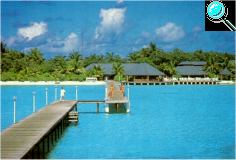| |
The Maldivian archipelago located 300 miles southwest of the southern tip of India and 450 miles west of Sri Lanka is a beautiful string of 1,1 90 low-lying coral islands scattered across the equator in the vast expanse of the Indian Ocean, giving us a rare glimpse of what is aptly described as a tropical paradise. Just consider this - sparkling white sun-kissed beaches; crystal-clear lagoons studded with profusely-coloured corals; azure warm seas with an undisturbed, exotic marine life; palm-fringed islands; the pervading serenity; all of it summarised by the famous Moroccan traveler Ibn Battuta on describing Maldives as "One of the wonders of the world".
|
| |

 |
| |
There are also indications that the Maldives, being on an important trade route, was settled by people from all over the world. This leaves the origins of the people enshrined in mystery. However, the main stock of the Maldivian people, as seen from physical features and supported by historical evidence of migration, are predominantly Aryan or Dravidian.
Throughout the Maldives a language which belongs to the Indo-Iranian group, Dhivehi, is spoken. It shows a strong Arabic influence. Dhivehi written from right to left is the official language of the country. As a second working language, English is widely used in government offices. Other foreign languages, however, are widely used within the tourism industry. Foreign languages, mainly English, are also frequently used in commerce.
The Maldives has been an independent country, except for a brief period of 15 years and 6 months of Portuguese rule in the middle of the 16th century. Between 1887 and 1965, the Maldives was a British protectorate though Britain did not interfere with the internal affairs of the country.
Maldives regained her full sovereignty in 1965. The newly independent country changed from a sultanate to a republic on 11 November 1968.
The Sun, the Sand and the Sea. These are just the three simple realities beckoning tourists from far and wide to these little islets, giving as a result, a glorious sense of happiness and proving to be a heavenly getaway from the world and its worries. The Maldives teaches the visitors the pleasurable art of doing nothing, simply lazing around and enjoying some of the most spectacular and colourful vistas offered by Nature. No wonder then that tourists flock in large numbers to the 70-odd self-contained island resorts provided with all the comforts and warmth exuded by traditional Maldivian hospitality. Which is why Maldives is considered to be the ultimate destination, the future world for holiday-makers. |
| |
 |
|



